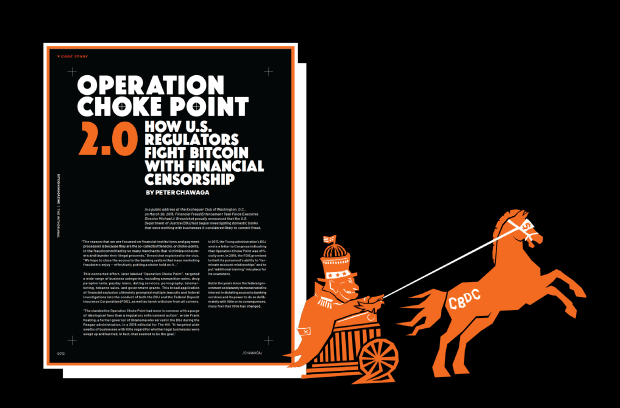This text is featured in Bitcoin Journal’s “The Withdrawal Problem”. Click here to subscribe now.
A PDF pamphlet of this text is out there for download.
“The explanation that we’re centered on monetary establishments and fee processors is as a result of they’re the so-called bottlenecks, or choke-points, within the fraud dedicated by so many retailers that victimize shoppers and launder their unlawful proceeds,” Bresnickat defined to the membership. “We hope to shut the entry to the banking system that mass advertising and marketing fraudsters get pleasure from — successfully placing a choke maintain on it…”
This concerted effort, later labeled “Operation Choke Level”, targeted a wide range of business categories, together with ammunition gross sales, drug paraphernalia, payday loans, relationship companies, pornography, telemarketing, tobacco gross sales, and authorities grants. This broad utility of monetary exclusion finally prompted a number of lawsuits and federal investigations into the conduct of each the DOJ and the Federal Deposit Insurance coverage Company (FDIC), in addition to harsh criticism from all corners.
“The clandestine Operation Choke Level had extra in widespread with a purge of ideological foes than a regulatory enforcement motion”, wrote Frank Keating, a former governor of Oklahoma who served within the DOJ in the course of the Reagan administration, in a 2018 editorial for The Hill. “It focused large swaths of companies with little regard for whether or not authorized companies have been swept up and harmed. Actually, that appeared to be the purpose.”
In 2017, the Trump administration’s DOJ wrote a letter to Congress indicating that Operation Choke Level was formally over. In 2018, the FDIC promised to restrict its personnel’s capability to “terminate account relationships” and to place “extra coaching” into place for its examiners.
However within the years for the reason that federal authorities so blatantly demonstrated its curiosity in dictating entry to banking companies and its energy to take action intentionally with little or no penalties, many really feel that little has modified.

Financial institution Runs, With Bias
On March 8, 2023, it was announced that the cryptocurrency-focused establishment Silvergate Financial institution can be voluntarily liquidated by its holding firm. The financial institution had been focused on serving cryptocurrency clients since 2013 when its CEO Alan Lane first invested in bitcoin. In 2022, it had acquired the know-how behind Meta’s failed stablecoin mission, Diem, with hopes of launching its personal dollar-backed token. Because the cryptocurrency market declined in late 2022, marked by the collapse of one in all its largest purchasers in cryptocurrency trade FTX, the financial institution’s inventory worth plummeted. It probably didn’t assist that on the identical time, U.S. Senators Elizabeth Warren, Roger Marshall, and John Kennedy asked Silvergate to disclose details of its monetary relationship with collapsed cryptocurrency trade FTX.
Quickly after, on March 10, 2023, nearly ten years to the day from Bresnickat’s public detailing of Operation Choke Level, Silicon Valley Financial institution (SVB) was seized by the California Division of Monetary Safety and Innovation and positioned underneath FDIC receivership, marking what was then the second-largest financial institution failure in U.S. historical past.
Since 2021, the financial institution had been rising its long-term securities holdings however, because the market worth of those property deteriorated amid U.S. greenback inflation and Federal Reserve rate of interest hikes, it was left with unrealized losses. Concurrently, its clients, many of whom have been outstanding companies inside the cryptocurrency trade and have been equally strained by financial situations, have been withdrawing their cash. On March 8, 2023, SVB introduced that it had bought greater than $21 billion price of securities, borrowed one other $15 billion, and was planning an emergency sale to boost yet one more $2.25 billion. Maybe unsurprisingly, this sparked a run on its remaining funds, totaling some $42 billion in withdrawals by March 9, 2023. On Sunday, March 12, state and federal authorities stepped in; clients of Signature Financial institution had withdrawn more than $10 billion.
Since 2018, Signature Financial institution had maintained a give attention to cryptocurrency companies, with some 30% of its deposits coming from the sector by early 2023. Signature Financial institution had additionally accrued a big proportion of uninsured deposits, worth some $79.5 billion and constituting almost 90% of its total deposits. It was holding relatively little cash on hand — only about 5% of its total assets (compared to an industry average of 13%) — so it was poorly ready for a run on crypto-friendly banks spurred by SVB’s points. On March 12, 2023, the New York State Division of Monetary Providers closed Signature Financial institution and positioned it underneath FDIC receivership because it confronted a mountain of withdrawal requests. On the time, this represented the third-largest financial institution failure in U.S. historical past.
Following their seizures of SVB and Signature Financial institution, the U.S. Division of the Treasury, Federal Reserve, and FDIC described the takeovers as “decisive actions to guard the U.S. economic system by strengthening public confidence in our banking system”. However others advised the actions, notably in opposition to Signature Financial institution, signified a blatant reemergence of the unfairness displayed throughout Operation Choke Level and related to a bigger effort to stymie cryptocurrency companies.
“I believe a part of what occurred was that regulators wished to ship a really robust anti-crypto message”, Barney Frank, a Signature Financial institution Board member and former congressman who helped draft the seminal “Dodd-Frank Act” to overtake monetary regulation following the Nice Recession, informed CNBC in March 2023. “We grew to become the poster boy as a result of there was no insolvency based mostly on the basics.”
Following an FDIC announcement that Flagstar Financial institution would assume all of Signature Financial institution’s money deposits aside from these “associated to the digital-asset banking companies”, the editorial board of The Wall Road Journal introduced that Frank was proper to name out this bias.
“This confirms Mr. Frank’s suspicions — and ours — that Signature’s seizure was motivated by regulators’ hostility towards crypto”, the board wrote. “Meaning crypto corporations should discover one other financial institution to safeguard their deposits. Many say that authorities warnings to banks about doing enterprise with crypto clients is making that arduous.”
Concentrating on A New Choke Level
Public officers, monetary professionals, and Bitcoin advocates had been declaring an obvious bias in opposition to cryptocurrency companies from the Biden administration nicely earlier than the March 2023 financial institution runs. There have been quite a few coverage occasions within the early a part of 2023 to again up these sentiments.
A January 3, 2023, “Joint Statement on Crypto-Asset Risks to Banking Organizations” from the Federal Reserve, FDIC, and Workplace of the Comptroller of the Forex (OCC) famous that, “The occasions of the previous 12 months have been marked by vital volatility and the publicity of vulnerabilities within the crypto-asset sector. These occasions spotlight a variety of key dangers related to crypto-assets and crypto-asset sector individuals that banking organizations ought to concentrate on…”, successfully serving to dissuade monetary establishments from taking over these dangers.
A White Home “Roadmap to Mitigate Cryptocurrencies’ Risks” launched on January 27, 2023, indicated that the Biden administration sees the proliferation of cryptocurrencies as a menace to the nation’s monetary system and warned in opposition to the prospect of granting cryptocurrencies extra entry to mainstream monetary merchandise.
“As an administration, our focus is on persevering with to make sure that cryptocurrencies can not undermine monetary stability, to guard traders, and to carry unhealthy actors accountable”, per the roadmap. “Laws mustn’t greenlight mainstream establishments, like pension funds, to dive headlong into cryptocurrency markets… It might be a grave mistake to enact laws that reverses course and deepens the ties between cryptocurrencies and the broader monetary system.”
On February 7, 2023, the Federal Reserve pushed a rule to the Federal Register clarifying that the establishment would “presumptively prohibit” state member banks from holding crypto property as principal in any quantity and that “issuing tokens on open, public, and/or decentralized networks, or comparable programs is very more likely to be inconsistent with secure and sound banking practices”.
And on Might 2, 2023, the Biden administration proposed a Digital Asset Mining Vitality (DAME) excise tax, advised as a option to power cryptocurrency mining operations to financially compensate the federal government for the “financial and environmental prices” of their practices with a 30% tax on the electrical energy they use.
For Brian Morgenstern, the pinnacle of public coverage at Riot Platforms, one of many largest, publicly traded bitcoin miners based mostly within the U.S., these coverage solutions, updates, and rule modifications clearly point out a bigger try and hinder Bitcoin development by concentrating on monetary choke factors.
“The White Home has proposed an excise tax on electrical energy use by Bitcoin mining companies particularly — an admitted try to regulate authorized exercise they don’t like, within the identify of environmental safety”, Morgenstern defined in an interview with Bitcoin Journal. “The one clarification for such inexplicable habits is deep-rooted bias in favor of the established order and in opposition to decentralization.”
Collectively, this habits might affect the conduct of regulated banks, simply because the stress utilized by the DOJ within the 2010s unduly restricted the companies in its crosshairs again then. For a lot of, it’s clear that Operation Choke Level has been reinstated.
“‘Operation Choke Level 2.0’ refers back to the coordinated effort by the Biden administration’s monetary regulators to suffocate our home crypto economic system by de-banking the trade and severing entrepreneurs from the capital essential to speculate right here in America”, U.S. Senator Invoice Hagerty, a member of the committees on banking and appropriations, informed Bitcoin Journal. “It seems that monetary regulators have purchased into the false narrative that cryptocurrency-focused companies solely exist to facilitate or conduct illicit actions, and so they appear blind to the alternatives for the potential improvements and new companies that may be constructed.”

Stress The place It Hurts
It might be pretty apparent how such a stress marketing campaign by federal regulators would damage cryptocurrency-focused tasks that depend upon entry to banks. However the bigger ramifications of such monetary prohibitions for retail clients and the development of Bitcoin particularly is probably not.
Why ought to proponents of Bitcoin, a decentralized monetary rail designed to perform outdoors of the legacy system, care a few choke level in regulated monetary establishments?
Caitlin Lengthy, the founding father of Custodia Financial institution, which is targeted on bridging the hole between digital property and legacy monetary companies, acknowledges that for customers within the U.S. to legitimately take part in Bitcoin, the regulatory panorama should be accommodating.
“I’ve been working for years to assist allow legal guidelines to be enacted, in a number of U.S. states and federally, exactly as a result of within the absence of authorized readability about Bitcoin, authorized programs can change into assault vectors on Bitcoiners”, she stated in an interview with Bitcoin Journal. “All of us dwell underneath authorized regimes of some type, and we should always concentrate on authorized assault vectors and work towards resolving them in an enabling means.”
Lengthy’s advocacy could finest characterize the potential that favorable and even simply equitable monetary entry might imply for Bitcoin adoption and the development of its know-how for everybody. By way of her work, Custodia (then underneath the identify Avanti) obtained a 2020 bank charter in its house state of Wyoming that made it a special-purpose depository establishment able to custodying bitcoin and different cryptocurrencies on behalf of purchasers. However, following a chronic delay in approval of Custodia’s utility for a grasp account with the Federal Reserve that may enable it to leverage the FedWire community and facilitate massive transactions for purchasers with out enrolling intermediaries, Custodia filed a lawsuit against the Fed last year.
“Operation Choke Level 2.Zero is actual — Custodia realized about its existence in late January when press leaks hit and reporters began calling Custodia to say they realized that every one financial institution constitution candidates on the Fed and OCC with digital property of their enterprise fashions, together with Custodia, have been just lately requested to withdraw their pending functions”, Lengthy stated. “Reporters informed us that the Fed’s vote on Custodia’s utility can be a foregone conclusion earlier than the Fed governors truly voted.”
However, extra than simply stifling innovators who search to construct bridges between Bitcoin and legacy monetary companies, concentrating on the choke factors of Bitcoin platforms will solely push these platforms outdoors of the scope of regulators, giving these with malicious intent a bonus over those that are trying to play by the foundations.
“Web-native cash exists. It gained’t be uninvented”, Lengthy added. “If federal financial institution regulators have a prayer of controlling its impression on the standard U.S. greenback banking system, they’ll get up and understand it’s of their curiosity to allow regulatory-compliant bridges. In any other case, simply as with different industries that the web has disrupted — company media, for instance — the web will simply go round them and they’re going to face even larger issues down the street.”
As was laid naked by the collapse of cryptocurrency trade FTX, Bitcoin remains to be very a lot tied to the world of cryptocurrency at massive within the portfolios of traders and the eyes of most individuals around the globe. Certainly, the revelations round FTX’s felony operations have been a living proof for regulators who search the monetary prohibition of cryptocurrency companies. However this very prohibition could have enabled FTX’s operators to fleece billions in customer funds: Based mostly on a Caribbean island, the overwhelming majority of FTX’s enterprise was outside of the jurisdiction of U.S. regulators. As U.S. regulators restrict the expansion of home companies, offshore alternate options like FTX profit.
And whereas many Bitcoiners might imagine that policymakers are powerless to find out the success of this permissionless know-how, opposed or absent laws can restrict Bitcoin-specific companies simply as harshly as they do broader, cryptocurrency-related ones. Actually, it might be Bitcoin’s distinctive properties that make the present regulatory panorama such a frightening one for progress.
“Bitcoiners ought to care about Operation Choke Level 2.Zero as a result of sure policymakers are attempting to remove our capability to take part within the Bitcoin community”, Morgenstern argued. “Furthermore, Bitcoin is totally different. It isn’t solely the oldest and most examined asset on this house, it’s maybe the one one that everybody agrees is a digital commodity. Meaning the on-ramp for inclusion into any coverage frameworks can have much less friction inherently, and Bitcoiners want to grasp this.”
Relieving The Choke Factors
Reviewing the current, hostile coverage updates from federal regulators, it appears clear that Bitcoin is firmly entrenched together with “crypto” of their minds. And, Bitcoin proponents particularly will agree, many companies centered on different cryptocurrencies are apt to harm traders. However some within the Bitcoin sector assume that extra schooling might assist underscore the distinctions between Bitcoin and altcoins, and higher defend Bitcoin from extra justified regulatory limits on manipulated tokens and vaporware.
“Interact along with your elected officers”, Morgenstern inspired. “Assist them perceive that Bitcoin’s decentralized ledger know-how is democratizing finance, creating quicker and cheaper transactions and offering much-needed optionality for shoppers at a time when the centralized finance system is experiencing misery. This can take time, effort and loads of communication, however we should work collectively to assist our leaders recognize what number of votes and the way a lot prosperity is at stake.”
Certainly, for these elected officers who do acknowledge this bias as unduly dangerous to innovation, continued advocacy from Bitcoin’s supporters is the easiest way out of the choke maintain.
“This isn’t a problem the place folks can afford to be on the sidelines anymore”, Hagerty concluded. “I encourage those that need to see digital property flourish in the USA to make your voice heard, whether or not that’s on the poll field or by contacting your lawmakers and urging them to help constructive coverage proposals.”
This text is featured in Bitcoin Journal’s “The Withdrawal Problem”. Click here to subscribe now.
A PDF pamphlet of this text is out there for download.






More NFT News
Will They Mine Or Maul It?
It is Time To Swap Your {Dollars} For Bitcoin
High 10 Suggestions for Each Bitcoin Multisig Newbie